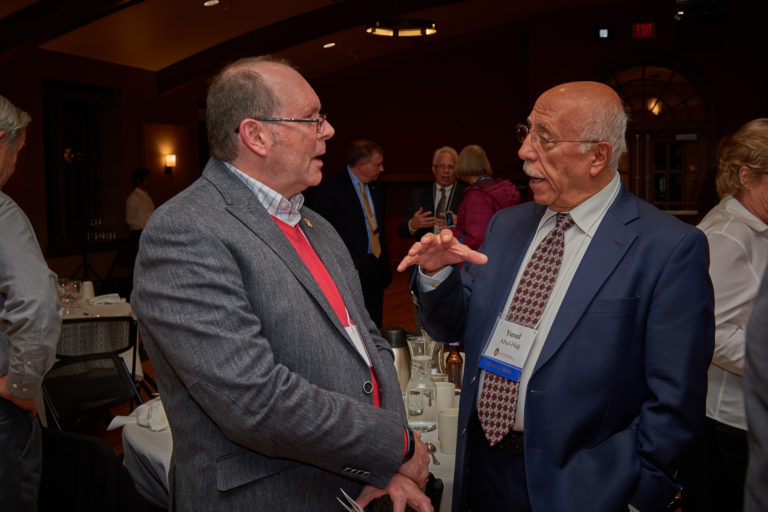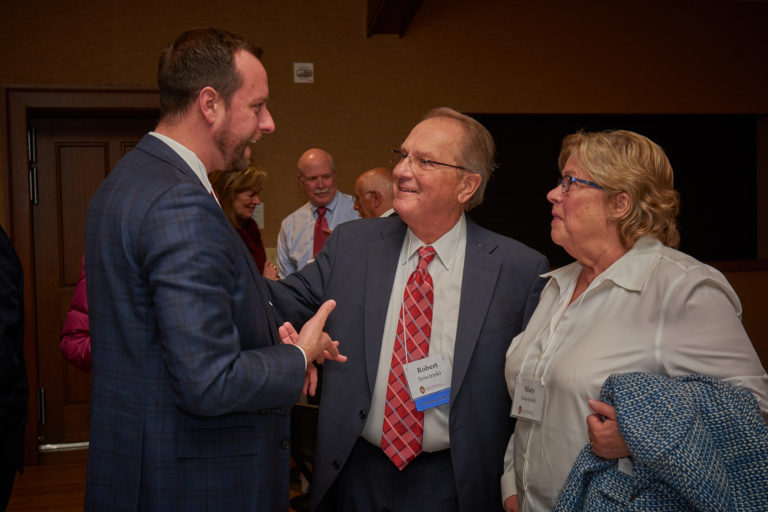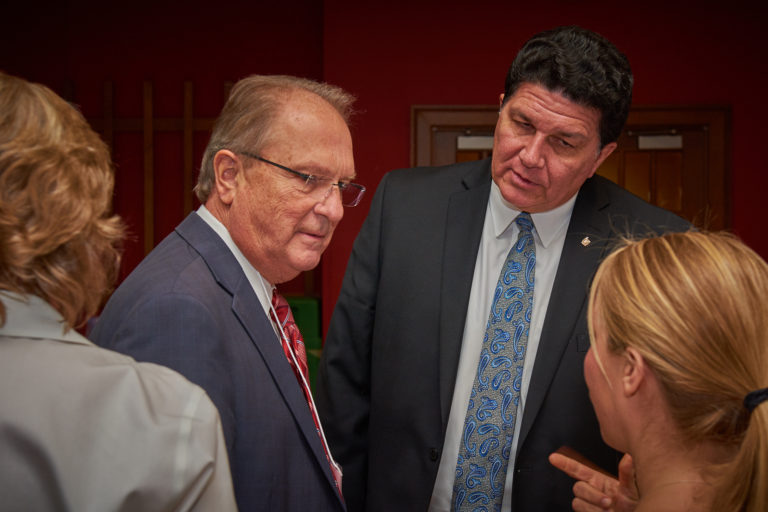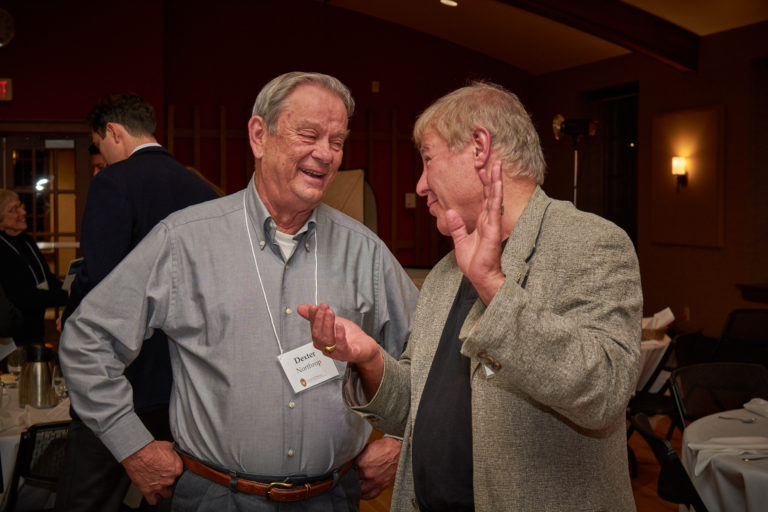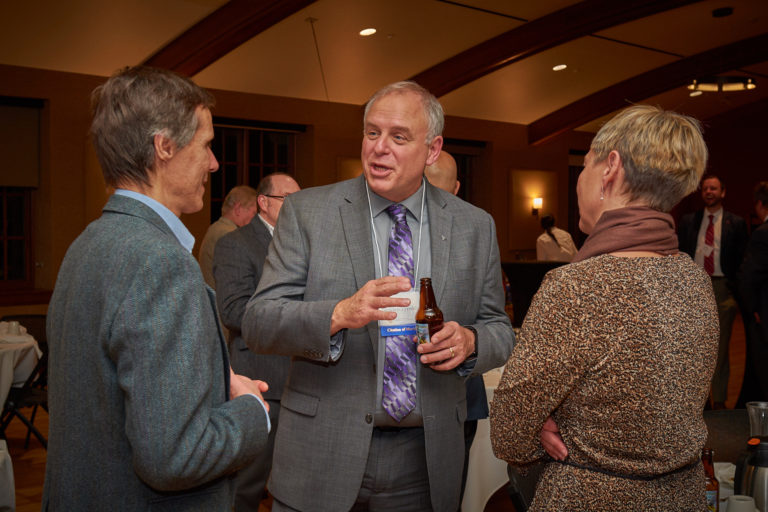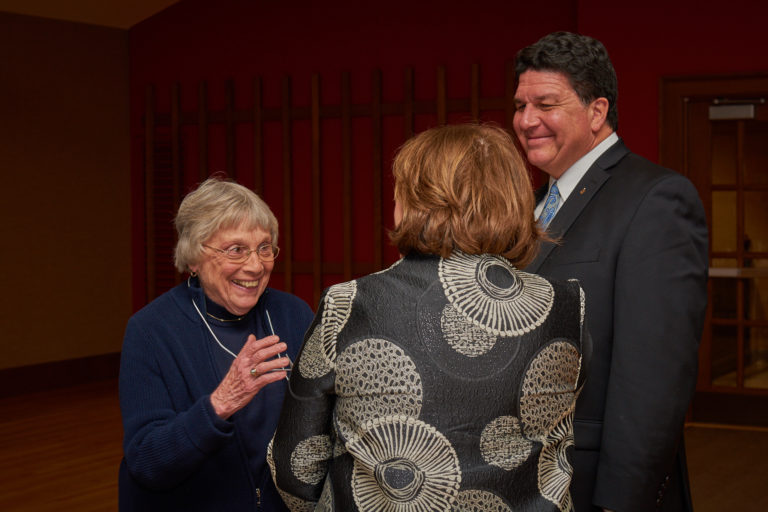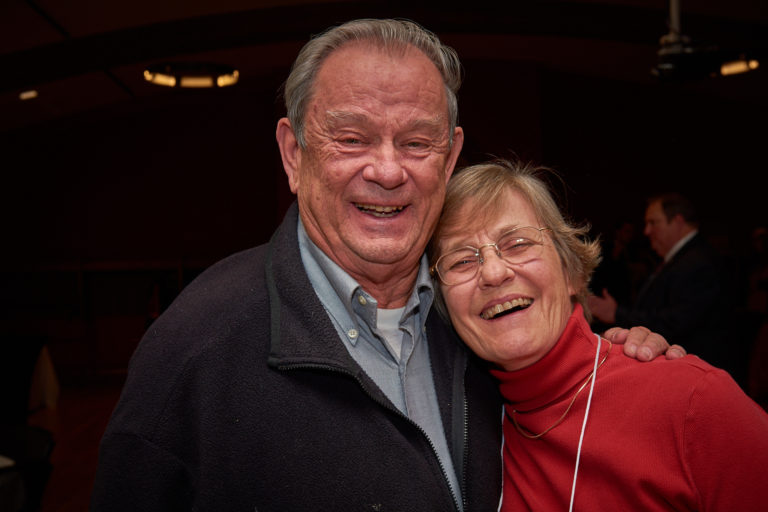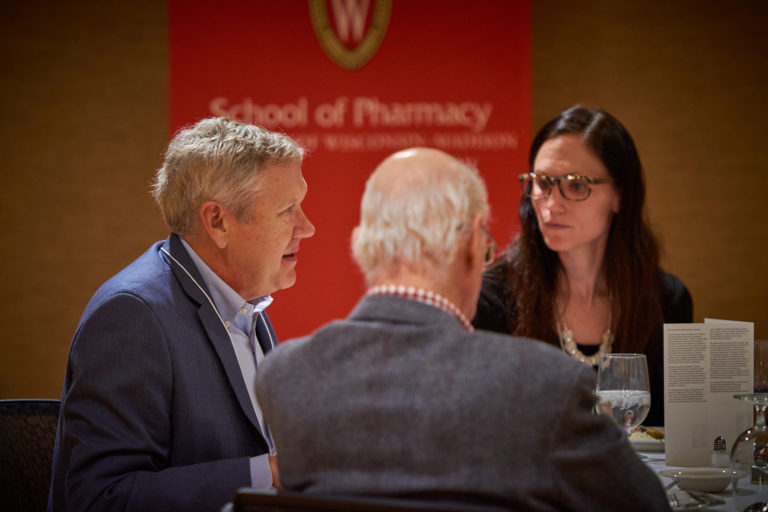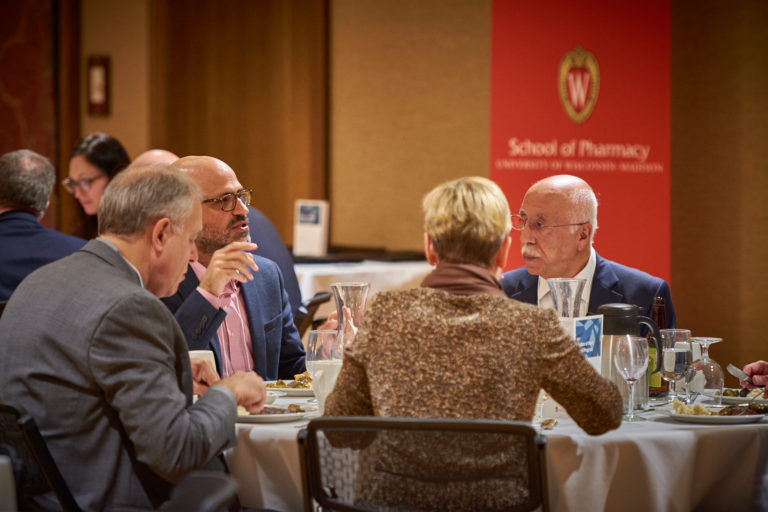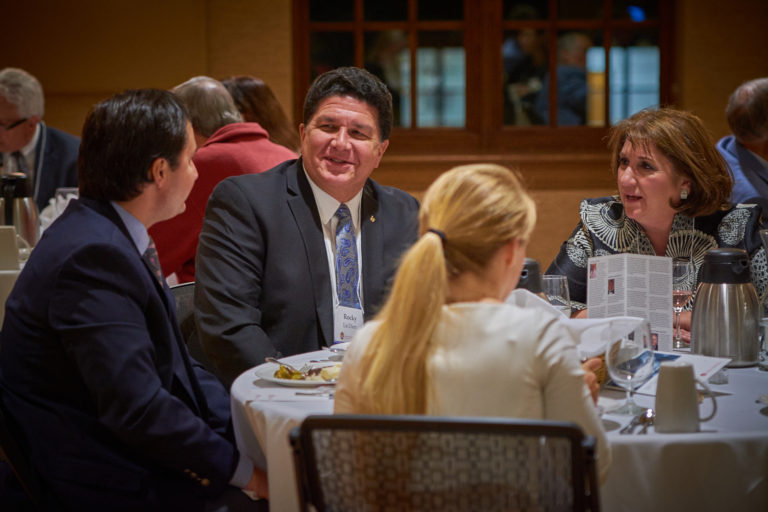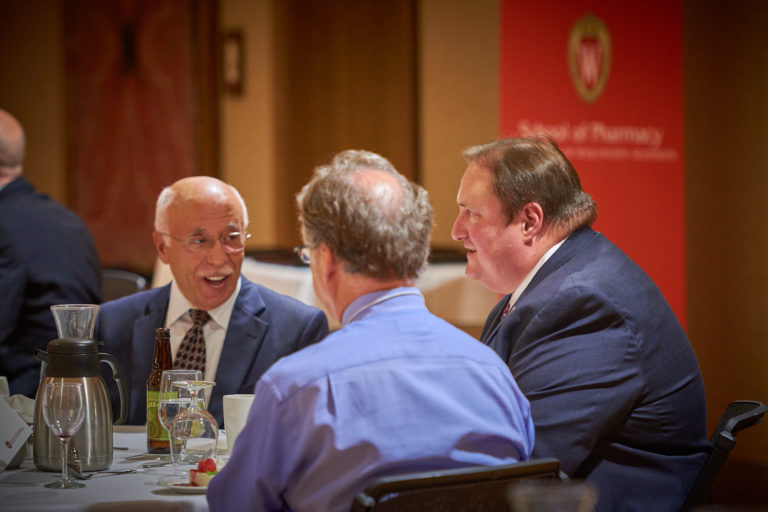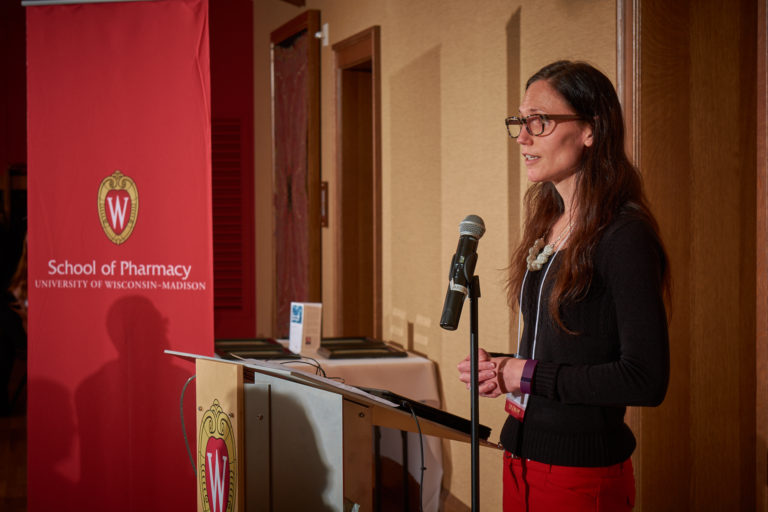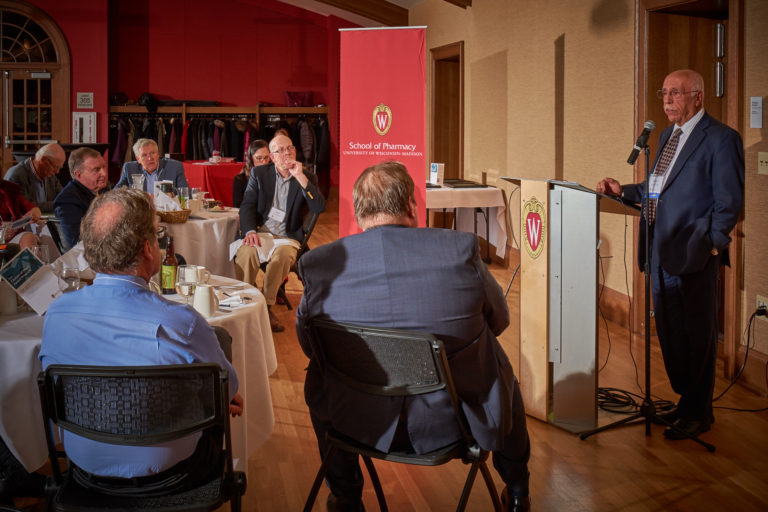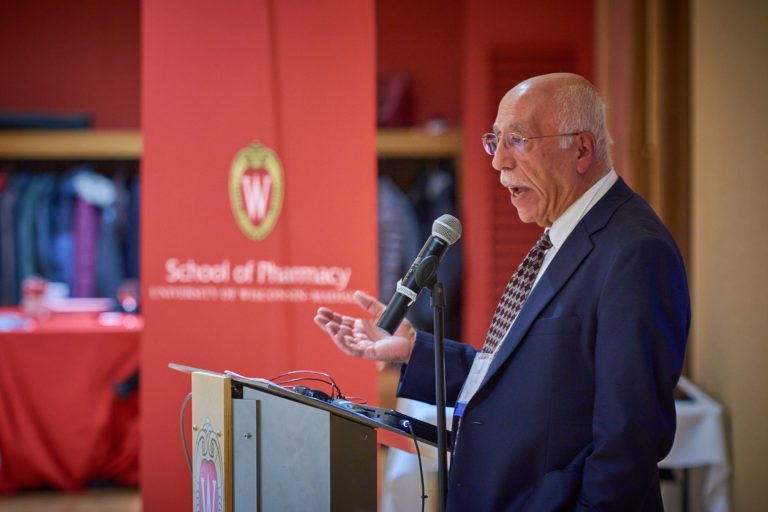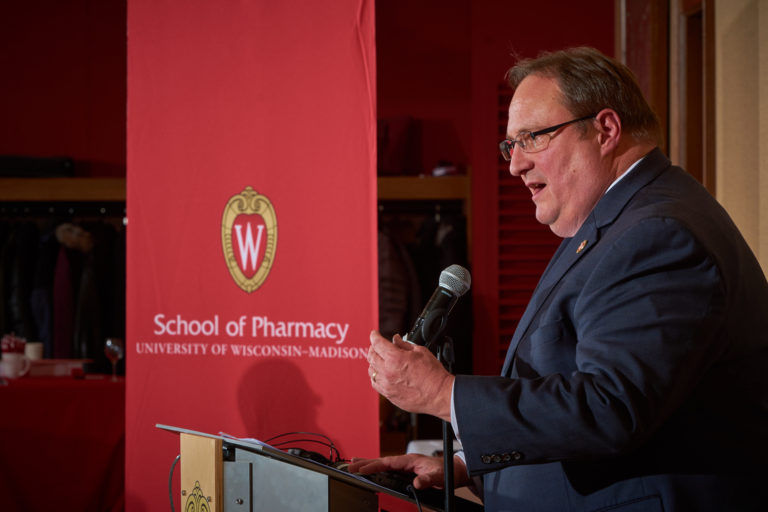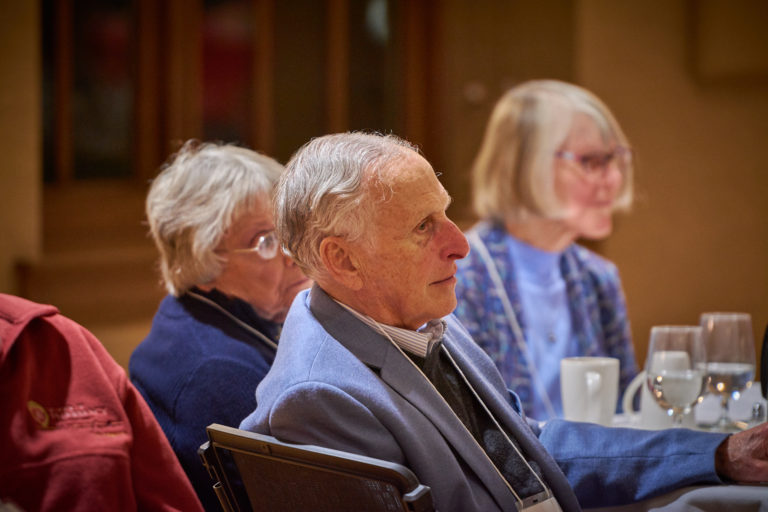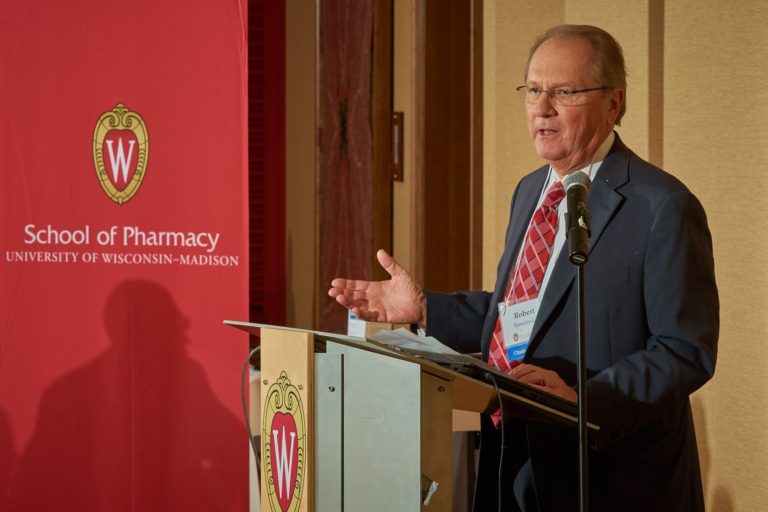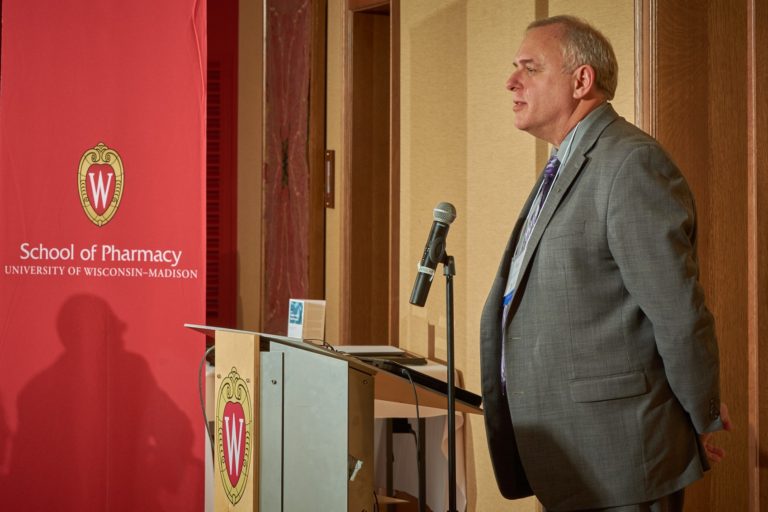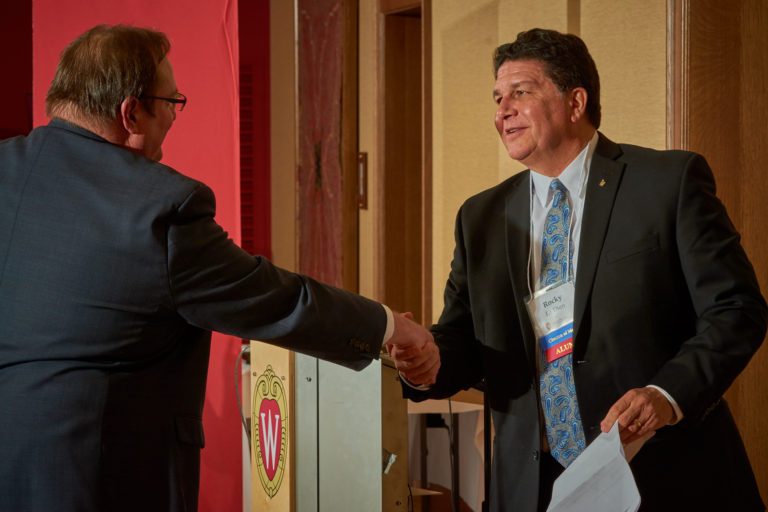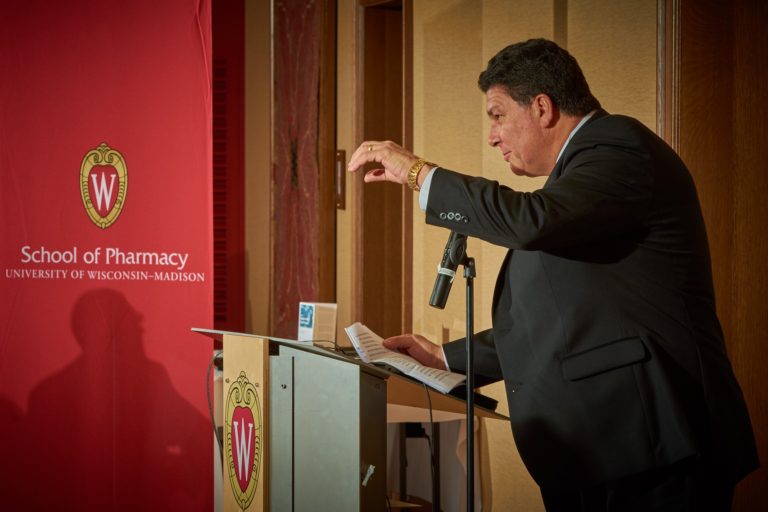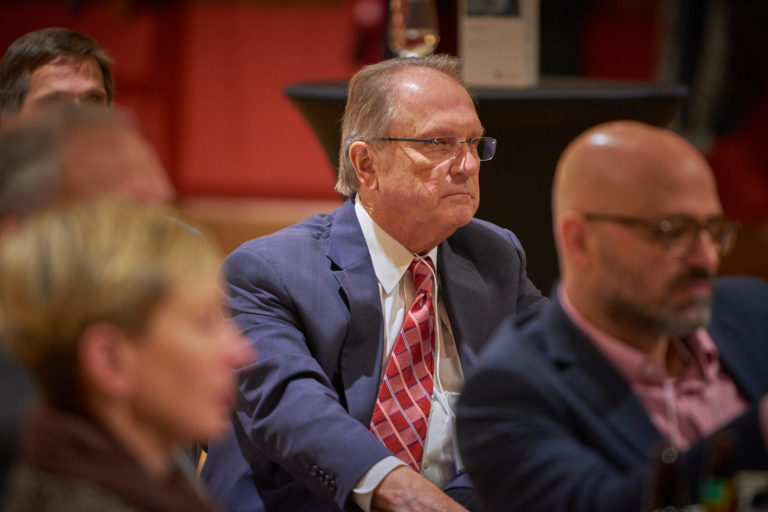By Katie Ginder-Vogel
Photos by Bruce Fritz
Since 1953, the University of Wisconsin–Madison School of Pharmacy has given Citation of Merit Awards to distinguished alumni or friends of the School each year. Award winners are selected based on their significant contributions to pharmacy, the pharmaceutical sciences, and society through research, teaching, or involvement in professional organizations as well as their support of the School of Pharmacy.
The awards are presented each fall, as part of the alumni weekend celebration. The 2017 Citation of Merit Award recipients were honored on November 10 at an awards dinner at the Carson Gulley Center on the UW–Madison campus. The 2017 honorees are:
- Yusuf J. Abul-Hajj, professor emeritus of medicinal chemistry in the College of Pharmacy at the University of Minnesota
- Rocky LaDien, area healthcare supervisor at Walgreens
- Robert Sowinski, former CEO of Diversified Insurance Solutions
- Raymond Skwierczynski, vice president and head of pharmaceutical operations for CoLucid Pharmaceuticals
“These four honorees are incredibly accomplished in their fields and represent excellence as professionals and citizens, as scholars and leaders,” says Steve Swanson, dean of the UW–Madison School of Pharmacy. “We are very proud to be part of their journey as the catalyst in launching their successful careers.”
“I loved pharmacy school and am so thankful to everybody who helped form me and encouraged me to want to do things.” –Bob Sowinski
Robert Sowinski (B.S. ’75)
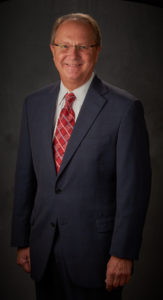
Wisconsin native Robert (Bob) Sowinski thought he wanted to be a physician until he studied in the pharmacy program at the UW–Madison School of Pharmacy.
“I wanted to go to medical school and got waitlisted,” Sowinski says. “My dad used to say that if you stopped going to school, you might not go back, so I decided to go to pharmacy school as a continuation of my studies, thinking I could reapply to medical school the next year.
“But once I started pharmacy school, I liked it and met people, and I quickly changed focus, got to know pharmacy well, and stayed on track to finish my pharmacy degree at the School of Pharmacy.”
Sowinski enjoyed his academic training in physiology and chemistry and has fond memories of learning to manufacture drugs in pharmacy school.
“It’s an art form that’s not with us any longer, but it’s part of our heritage,” Sowinski explains. “Originally, pharmacists made capsules and tablets, until industry took over, but we learned how to do it. I remember flavoring liquids with alcohol and making capsules and tablets, all the things we had the opportunity to learn, in addition to basic science.”
Sowinski planned to be a community pharmacist and felt that he was well-prepared to interact and communicate with people in that role, but as it turned out, pharmacy became more of a jumping-off point for Sowinski. After graduation from the School of Pharmacy, he took his first job at Stein Drug, a community pharmacy with 21 stores throughout Wisconsin, whose owner Marty Stein was innovating with prescription-related areas, like vision, hearing aids, home health care, and medical supplies. Sowinski held a number of management positions at Stein Drug and eventually rose to vice president for professional services until Walgreens acquired Stein Drug in 1979.
“I had to make a decision about what I wanted to do,” says Sowinski. “I wanted to pursue new areas, knowing that as more Baby Boomers reached older age, there would be a greater demand for home health care, vision, and hearing aids, so I decided to step aside from true pharmacy and pursue those other areas.”
Marty Stein offered to partner up with Sowinski, and the two built a new company, EyeCare One Corp/Stein Health Services, that launched and operated 18 retail optical centers, Stein Optical, in the Milwaukee area; started and operated a national ostomy mail order catalogue business, American Ostomy Supply; and established a full-service high-tech home care and I.V. infusion therapy business that operated in Milwaukee, Madison, and Appleton, Wisconsin.
“I ended up in insurance, which is not where I started, but my roots in pharmacy provided me with a solid base.” –Bob Sowinski
Later, Sowinski and Stein started Vision Insurance Plan of America, a licensed vision insurance company that markets prepaid vision plans to employers through the Insurance Brokerage Network. Sowinski served as CEO and president until the company, along with Stein Optical stores, were sold to Vision Twenty-One. Sowinski became senior vice president of retail at Vision Twenty-One, responsible for managing three chains, 78 stores, and $63 million in sales, as well as a laser vision correction center and an associated ophthalmology practice.
Sowinski was open-minded about moving his career in new directions.
“Every time I reached a point where there was an opportunity, I evaluated it and went in a new direction,” says Sowinski. “I ended up in insurance, which is not where I started, but my roots in pharmacy provided me with a solid base.”
Sowinski took a different turn again and spent a year as president of Substance Abuse Management, Inc. (SAMI) in Milwaukee, which manages Corporate Drug-free Workplace Programs, helping the company become profitable and get acquired. His next role was CEO and president of Diversified Insurance Solutions in Brookfield, Wisconsin, from which he retired.
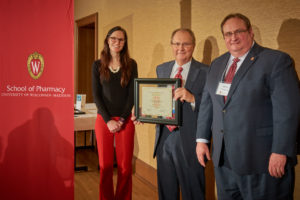
He advises current students to be open to new opportunities, just as he was.
“Study hard, work hard, enjoy yourself, and keep yourself open to opportunities,” Sowinski advises. “Don’t be afraid to move around, whether it’s forwards, backwards, or even sideways.”
Sowinski was delighted to be invited back to UW–Madison to receive his Citation of Merit Award.
“It was really nice to be offered an opportunity to come back home, where I started my career, at the school that provided me with a solid foundation in pharmacy and within the health care delivery system,” Sowinski says.
“It was very special to be invited back to the School of Pharmacy and see professors of mine and former deans. I loved pharmacy school and am so thankful to everybody who helped form me and encouraged me to want to do things. I’ve had an interesting life, and I’m very grateful to everyone who contributed to making it what it is.”
Read more about Bob Sowinski.
“The training I got at Madison was the primary reason why I have become a successful scientist.” –Yusuf Abul-Hajj
Yusuf J. Abul-Hajj (Ph.D. ’68)
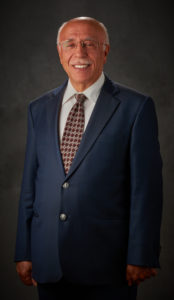
Yusuf Abul-Hajj retired from his 21-year position as head of the Department of Medicinal Chemistry at the University of Minnesota at the end of June but still goes to work almost every day, although he did take a break recently to travel with his wife for several weeks. He attended the Citation of Merit awards dinner and the UW football game with his son, an alumnus of the University of Wisconsin–Madison who holds a Master in Public Health and works in analytics in Minneapolis.
Abul-Hajj earned his Ph.D. in pharmaceutical chemistry at the School of Pharmacy, where he studied steroids, steroid chemistry, and biochemistry.
“Steroids are involved in so many different aspects of health—synthesis, biometabolism, transformations using microbes, treatment of patients, cancer treatment, and induction of cancer,” says Abul-Hajj. “I covered many of these areas in my research.”
After Abul-Hajj graduated with his doctorate from UW–Madison, he was hired as a faculty member at the University of Minnesota and has been there since.
“I have been happy here,” Abul-Hajj says from his office at the University of Minnesota. “I got many offers to leave, but I loved the group I was with—they’re outstanding, so why move someplace else? Also, I love the Twin Cities area.”
His most recent research has focused on the underlying mechanism(s) involved in the genotoxicity and/or carcinogenicity of estrogens. Another area of research focus involves the development of therapeutic agents for the treatment of breast cancer. He has published more than 100 publications and has several patents on aromatase inhibitors.
Inducted in 1990 as an AAAS Fellow by the American Association for the Advancement of Science, Abul-Hajj has been recognized for his research work. He has served as a member of the U.S. Army Medical Research and Development Command Study Section for Breast Cancer and Ad Hoc committees for the American Cancer Society, National Institutes of Health (NIH), and the National Sea Grant Program.
“The School of Pharmacy provided me with excellent training, and I am so proud I was able to prove myself.” –Yusuf Abul-Hajj
Moreover, he served as the senior editor for the American Chemical Society (ACS) Journal of Medicinal Chemistry from 1994-2012 and published a book in 2012 entitled From Digitalis to Ziagen: The University of Minnesota’s Department of Medicinal Chemistry. He also has presented his research findings at more than 120 symposia, industry events, and institutions in the United States, Europe, and Asia.
Abul-Hajj credits the UW–Madison School of Pharmacy with his career success.
“The training I got at Madison was the primary reason why I have become a successful scientist,” he says. “The professors were very demanding.”
Abul-Hajj also served as director of graduate studies at the University of Minnesota College of Pharmacy and believes that the key to staying motivated and being successful in graduate school is choosing the right project, not just the right advisor.
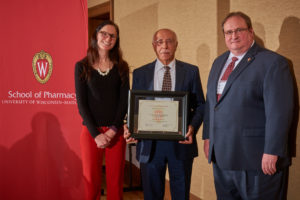
“Many students hear of these exceptional scientists and want to work with them,” Abul-Hajj says. “Sometimes they take on a research project and don’t like it or don’t have motivation to excel. Students who take on a project that they like very much are motivated, want to be independent, work very well, read a lot, and contact the advisor more frequently. I’ve seen two different types of students–some of those students ultimately get their degree but have not been very successful. Others continue to be successful if they are motivated.”
Abul-Hajj says he is honored to receive the Citation of Merit Award.
“The best recognition an individual can have is when one’s alma mater recognizes the contributions one has made,” says Abul-Hajj. “The School of Pharmacy provided me with excellent training, and I am so proud I was able to prove myself, not just to my colleagues at the University of Minnesota, but to be recognized by my alma mater. It is a great honor.”
Read more about Dr. Abul-Hajj.
“Receiving this honor just motivates me even more to make a difference.” –Rocky LaDien
Franklin (Rocky) LaDien (B.S. ’77)
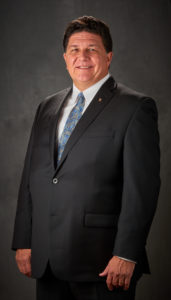
After graduating from UW–Madison School of Pharmacy in 1977, Rocky LaDien started as a hospital pharmacist at Deaconess Hospital in Milwaukee until 1980, when he took a position in long-term healthcare. However, his interest was still piqued by retail pharmacy, and he continued working part-time as a community pharmacist. Giving into that passion, he became a staff pharmacist at Snyder Drugs, which led to a 31-year career with Walgreens, where he is now an area healthcare supervisor, overseeing 80 pharmacies in Eastern Wisconsin.
“Key mentors at UW–Madison, such as Cab Bond, Monte Cohen, Dean George Zografi, Bonnie Svarstad, and Tom Thielke, were as important as the academic portion,” says LaDien. “These faculty members taught life lessons beyond their lesson plans.”
La Dien says the School of Pharmacy’s faculty and staff instilled in him a passion for helping others.
“I was known as the pharmacy student who was involved in a freak bike accident in my final year of schooling,” he says. “The outpouring of affection from both the faculty and student body changed my life and passion for this School. The love I received being in the hospital will stay with me forever!”
LaDien has continued to give back to UW–Madison, returning to the School of Pharmacy as a guest lecturer focusing on law, ethics, and management and serving on the Pharmacy Alumni Association’s re-accreditation committee and diversity committee (he also served as president). LaDien has mentored more than 100 School of Pharmacy students and leads annual career events for student pharmacists.
La Dien’s advice for current students is to find work-life balance, choose the right life partner, and ensure you are in a role that you truly look forward to when you wake up in the morning.
“Keep in mind always: You are here to help others.” –Rocky LaDien
“If not, move to something that excites you,” La Dien says. “Keep in mind always: You are here to help others.”
La Dien walks his talk. He recently collaborated with Eric Buxton, associate professor in the Division of Pharmacy Professional Development at the School of Pharmacy, and Sarah Sorum, the Pharmacy Society of Wisconsin’s vice president of professional and educational affairs, to develop the only professional development course in the country that teaches pharmacists proper injection techniques for non-vaccine therapies, so they can administer medications in an emergency room or critical care setting.
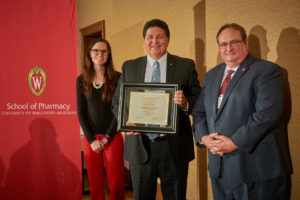
In another collaboration with the School, LaDien worked with Professor Emerita Bonnie Svarstad in the Social & Administrative Sciences Division and Professor Eva Vivian in the Pharmacy Practice Division to find interventions to more effectively treat hypertension in African-American patients in Madison and Milwaukee. In addition to a grant from the National Institutes of Health, the study was published in the Journal of the American Pharmaceutical Association in 2003.
LaDien also has been involved in Walgreens’ partnership with Children’s Hospital of Wisconsin, which provides a 30-day supply of HIV drug coverage to sexually abused children.
“It just warms my heart to even be considered for the Citation of Merit Award, especially with so many distinguished alums who have shaped the pharmacy profession globally,” says LaDien. “Receiving this honor just motivates me even more to make a difference.”
Read more about Rocky LaDien.
“The University of Wisconsin–Madison provides an environment that raises your game. The graduate program at the School of Pharmacy was hard work, but the opportunities it created were tremendous.” –Raymond Skwierczynski
Raymond Skwierczynski (M.S. ‘89, Ph.D. ’92)
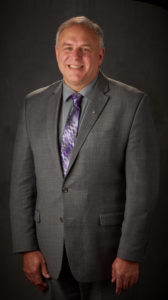
Raymond Skwierczynski is currently the vice president and head of pharmaceutical operations for CoLucid Pharmaceuticals in Cambridge, Mass., a seven-person public biopharmaceutical company that was recently acquired by Eli Lilly.
When Skwierczynski’s daughters were in elementary school, he used to tell them his job was to “make medicine.” As he took on more leadership responsibilities, he became immersed in every aspect of the pharmaceutical development business.
“Despite the complexity, the end goal of every development project is the same–to make medicine for patients who need it,” he says. “This goal, whether it is reached or not, is gratifying. When the goal is met, and you realize all of the work that went into making it happen, you just want to shout at the top of your lungs, ‘Wow! We did it!’”
Skwierczynski had a substantive leadership role in the development of a drug for multiple myeloma, a cancer formed by malignant plasma cells, that the FDA approved in November 2015. He was one of the inventors of the prodrug and formulation that allowed an intrinsically unstable drug to enter development.
“Late on the day of the approval, I reflected on the significance of the team’s accomplishment and on my personal journey to get to this day,” he says. “The first patient was dosed in 2008, the year during which my two brothers died of cancer. Seven years later, myeloma patients had more hope because of my work and the work of my colleagues.”
Skwierczynski’s professional career includes seven years at 3M Pharmaceuticals and 12 years at Takeda Pharmaceuticals (formerly Millennium Pharmaceuticals). He has served on the United States Pharmacopeia Dosage Forms Expert Committee since 2010, which updates and creates new public standards for the development of pharmaceutical dosage forms; has held leadership positions in the American Association of Pharmaceutical Scientists; and serves on the American Foundation for Pharmaceutical Education Board of Grants.
“To be recognized by the world-class university that provided me with the skills that allow me to do what I do is humbling.” –Raymond Skwierczynski
At the beginning of his career, Skwierczynski paid attention to his mentors’ approach to problem solving and saw that graduate school provided them with the tools to solve problems that were not directly related to their graduate research. He also learned the importance of good scientific presentations and written communication.
When he entered the graduate programs at the School of Pharmacy, he had the opportunity to engage with professors in small classes and one-on-one sessions and spend time reading books and journals, attending seminars, and talking to other students and researchers.
“Learning to think critically about research—be it your own or from the scientific literature—is important,” says Skwierczynski. “The University of Wisconsin–Madison provides an environment that raises your game. The graduate program at the School of Pharmacy was hard work, but the opportunities it created were tremendous.”
Skwierczynski has been highly engaged with School, involved with the Division of Pharmacy Professional Development programming at the UW–Madison School of Pharmacy since 1999. He has served on the planning committee and as chair of the 2004 June Research and Development Land O’Lakes Conference. In 2001, he and Scott Smith, director of pharmaceutical development and manufacturing at Gilead Sciences, created a short course on pharmaceutical stability that they have taught more than 20 times, both on campus and at various pharmaceutical companies.
Skwierczynski’s advice for current students is to enjoy each day, and to work and play hard.
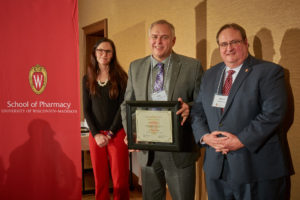
“The University of Wisconsin–Madison is an incredible place,” he says. “It is more than just the books and beakers in your lab. Attend seminars given by top researchers in disciplines related to your area of the pharmaceutical sciences. Take in a concert or an athletic event. Ride your bike around the city of Madison and the surrounding area. Run along the lakes. And, by all means, have a beer with friends on the Terrace!”
Skwierczynski, whose parents grew up during the Great Depression and completed the eighth grade, says earning his doctorate at UW–Madison was itself an honor, and earning the Citation of Merit Award was just as exciting.
“To be recognized with the Citation of Merit award is a terrific honor,” says Skwierczynski. “I was speechless when I received the notification letter from Dean Steve Swanson about the citation. To be recognized by the world-class university that provided me with the skills that allow me to do what I do is humbling.”
Read more about Dr. Skwierczynski.
